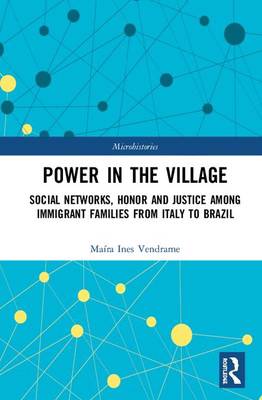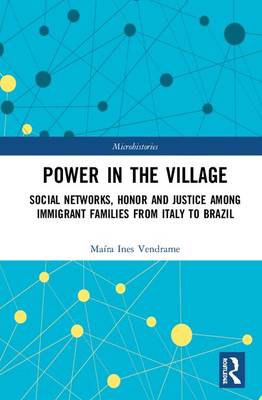
- Afhalen na 1 uur in een winkel met voorraad
- Gratis thuislevering in België vanaf € 30
- Ruim aanbod met 7 miljoen producten
- Afhalen na 1 uur in een winkel met voorraad
- Gratis thuislevering in België vanaf € 30
- Ruim aanbod met 7 miljoen producten
Power in the Village
Social Networks, Honor and Justice Among Immigrant Families from Italy to Brazil
Maíra Ines VendrameOmschrijving
Power in the Village explores the formation of late-nineteenth-century Italian rural society in southern Brazil, through an examination of how Italian peasants in northern Italy and southern Brazil solved issues related to family honor.
Looking specifically at social networks and justice practices to examine the kind of rationality that ruled individual and family behaviors, the book offers an understanding of the restoration of social balance in these communities, and explores the culture of immigrants, particularly in issues related to honor and morality. Taking as a case study the ambush and murder of a parish priest, Antonio Sorio, in January 1900 in Silveira Martins, a small town of Italian immigrants, Vendrame offers a reinterpretation of the society of Italian immigrants in southern Brazil. She argues that rather than being an idyllic picture of a homogeneous and harmonious society, the colonial settlements were places pervaded by tension, solidarity and self-interest, which guided individual and collective behavior.
This book will be of great interest to scholars working in Italian history, Brazilian history, immigration history and the history of colonialism. It will also be of interest to scholars working on ethnographic and religious history, as well as to social anthropologists.
Specificaties
Betrokkenen
- Auteur(s):
- Uitgeverij:
Inhoud
- Aantal bladzijden:
- 244
- Taal:
- Engels
- Reeks:
Eigenschappen
- Productcode (EAN):
- 9780367025175
- Verschijningsdatum:
- 27/05/2020
- Uitvoering:
- Hardcover
- Formaat:
- Genaaid
- Afmetingen:
- 188 mm x 254 mm
- Gewicht:
- 816 g

Alleen bij Standaard Boekhandel
Beoordelingen
We publiceren alleen reviews die voldoen aan de voorwaarden voor reviews. Bekijk onze voorwaarden voor reviews.











